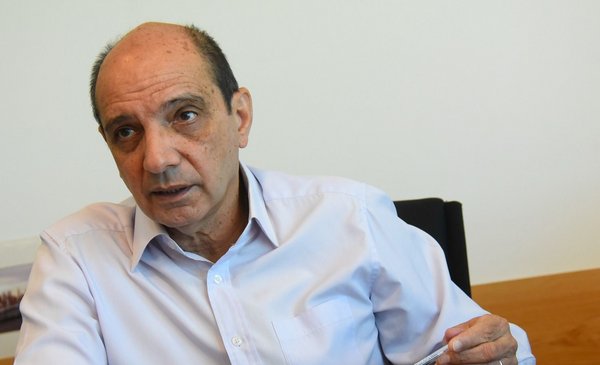The Secretary General of the National Drug Board (JND), Daniel Radío, harshly questioned in Parliament the bill promoted by two pro-government deputies that proposes the “voluntary” hospitalization of addicts and that now integrates the list of priorities of the government coalition in the Senate for this legislative year.
The hierarch, one of the main leaders of the Independent Partywas summoned last Tuesday to the Public Health Commission of the upper house, where he exposed a long series of “contradictions” in which, in his opinion, the text incurs.
Radio, which has already been publicly critical of the initiative, said, for example, that Article 1 maintains that the objective is to guarantee the right of every person to receive adequate and comprehensive treatment, but at the same time indicates that the costs will be borne by the interested party or who agrees to assume them. “In other words, the project itself acknowledges that it is not in a position to guarantee or that it says it is going to guarantee,” pointed.
For Radio, the project proposes a reasoning with many flaws: the possibility of interning those who oppose doing so when they are intoxicated, as long as they have previously stated in writing and before a notary public that they did want to. “This project mixes up and confuses treatment – to which we are all entitled – with hospitalization, which is just one more possibility and tool that, by the way, should be available when necessary”, raised.
The hierarch wondered from what scientific evidence the idea was extracted that the way to guarantee the right of people to be treated is by interning them involuntarily if they first signed before a notary. “Therapeutic responses must be individualized, taking into account the context, the stage of life in which the person is and the vital circumstances that they are going through. That is not solved with a ravioli,” he said.
Radio marked another contradiction: the same text admits the lack of public resources to allocate to the treatment of addicts. Also that the project does not even mention the provision of funds so that the eventual law is applied. “This project does not solve the problem of insufficient resources,” he said. “On the contrary, it aggravates them to the extent that it builds a greater demand for hospitalization,” alerted. He also questioned her not considering other treatment alternatives.
The chief also recalled that the project contradicts international standards for treatment for drug use and cited the World Health Organization (WHO), which indicates that patients should have the option of withdrawing from treatment at any time. In this regard, it was asked how the institutions will hold an addict hospitalized against his will: if they should apply physical methods, put up bars or resort to pharmacological measures that depress the conscience. “We must be careful not to fall into voluntary proposals, into easy and ingenious responses, because they generate expectations that will not be met and will bring more frustration,” he warned..
According to Radio, what emerges from voluntarism are the conspiracy theses that “they don’t solve the issue because they don’t want to” or “they don’t solve it because there are interests”.
The counterpoint with Manini
The head of the National Drug Secretariat thus ratified the position that he had exposed in the House of Representatives, in which the project has already been sanctioned. The difference is that now he was facing Senator Guido Manini Ríos. The leader of Cabildo Abierto defended the initiative, drafted in part by one of his deputies, Silvana Pérez Bonavita. “It gives possibilities to a number of people who are powerless today, who see how nobody does anything for them and they are left to their own devices,” he pointed.
Manini argued that “should be top concerns” of the National Drug Board that “thousands and thousands of Uruguayans” do not know what to do in these cases. “We cannot continue doing the same, because the results are not going to change”, plot.
Radio, meanwhile, insisted on its position. “The appeal to the bubble tactic, of removing the person from his environment, does not work”, he pointed. In his vision, the center of the story is not the use of a substance, but the person. Thus, different people with the use of the same substance do not generate the same results.
The hierarch pointed out that outpatient care should be promoted. According to what he quoted, last year 2,858 people entered this type of treatment in the National Drug Care Network.
scare campaigns
Another point of debate between Radio and Manini was about the need for public campaigns that warn about drug use. The leader of Cabildo Abierto called for a campaign similar to the one developed around tobacco. “You buy a box and they show you horrible photos,” he illustrated. He also called for an educational campaign in the media, schools and high schools to try to dissuade drug use. The senator wondered if that is already underway and if there are resources planned.
“Like the tobacco one, surely not”, Radio responded, which “confessed” that it never shared the anti-smoking policies and attributed the drop in consumption to a cultural change at the global level rather than to public actions. “Campaigns should be informative, not frightening,” express. “I doubt their effectiveness because, in reality, they are aimed more at those who are more concerned about consumption than at drug users,” concluded.
Surveys in high schools
The National Drug Board and the National Public Education Administration (ANEP) will present the results of a survey carried out in 2021 on 10,000 secondary school students in the coming days. There, Radio advanced, some alerts are raised. In particular the widespread use in young people of that age of energy drinks. “That is beginning to be a problem in society,” warned.
Meanwhile, the latest report on the consumption of cocaine base paste indicated that the number of users has remained stable in the last 15 years: around 10,000 people. The novelty is that the age has changed. “In general, base paste users are now older, probably because they are the same”, he explained. This, for Radio, could represent good news.







